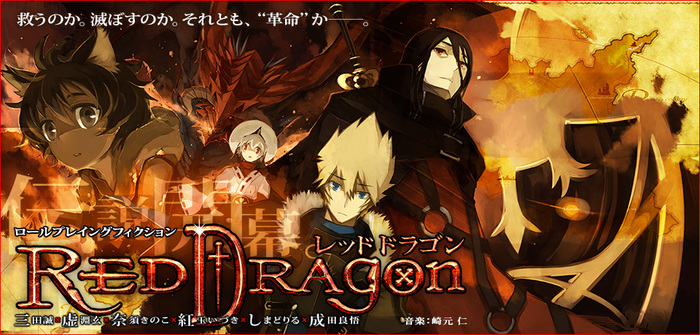Replays and Red Dragon
A Revolution in Fiction Unfolds
Imagine if you got a bunch of famous authors together, had them play D&D, and published the transcripts with illustrations and a sound track. That's kind of what Red Dragon is, except instead of D&D it uses a homebrew system and the authors are best known for light novels, anime, and visual novels.
"Replays" are cleaned-up tabletop RPG transcripts that share a number of publishing conventions with light novels. They've been around almost as long as RPGs in Japan, growing out of the "how to play an RPG" guide into a niche of their own. Red Dragon is a bit different than most in that the players are pretty high profile: Urobuchi Gen, Kinoko Nasu, and Narita Ryohgo are all in the game. Additionally, very few replay series have a full art team, promotional videos, original soundtracks, or fully-featured free online versions.

RPG war stories are popular anywhere; Blaize O'Glory's Post-Mortem Hall of Fame is a series of tales from the early days of the Internet, and these days there's a subreddit on the topic, besides any number of campaign blogs. The transcript style isn't popular (though there are examples) and the few dips into commercial publication are all fictionalized accounts like Dragonlance.
Replays aren't necessarily better than fictionalized versions; they depend a lot on the table dynamic between the players and can require knowledge of the rules that a novel would smooth over. That being the case, besides being easier to produce they can also function as advice on running a game in a more direct and convincing way than most Game Mastering tips. In R'Lyeh Antique, after the first session the GM goes to a cafe with one of his players and they have a frank discussion about the session not going very well. The scenario was a mystery and the holdup was a common one - the players need to find one particular clue to advance, but they don't, and the GM's hints and attempts to make it easy aren't enough to keep the game from slowing to a crawl. Though the discussion of how to deal with this doesn't have any epiphanies, it touches on problems of plot, games, and social situations in a way that doesn't come up in many kinds of writing.
I posted on Metafilter about this a while ago and it generated some interesting comments and good links which may be worth a look if you want to know more. The English Wikipedia article on Japanese RPGs is also remarkably thorough and worth a read. Ψ
Update: In 2015 Red Dragon was adapted into an anime called Chaos Dragon. Unfortunately it was terrible.
Except for crediting the players, no references to the TRPG nature of the original survived. The in-game story was cut up, re-structured, and stripped of all the jokes from the table. While there were many unfortunate changes, the most cynical and embarrassingly ham-handed one was definitely Urobuchi Gen's character's mysterious transformation from a slight man into a large-chested and revealingly dressed woman.
The Chaos Dragon plan also included a smartphone game and a storytelling board game. The smartphone game was a modified version of Sega's Chain Chronicle and not particularly interesting. The boardgame was announced as having a summer release, but summer is over and it hasn't been mentioned since the initial blurb so it's presumably dead or in development hell.
Sadly, this story did not have a happy ending. Ψ